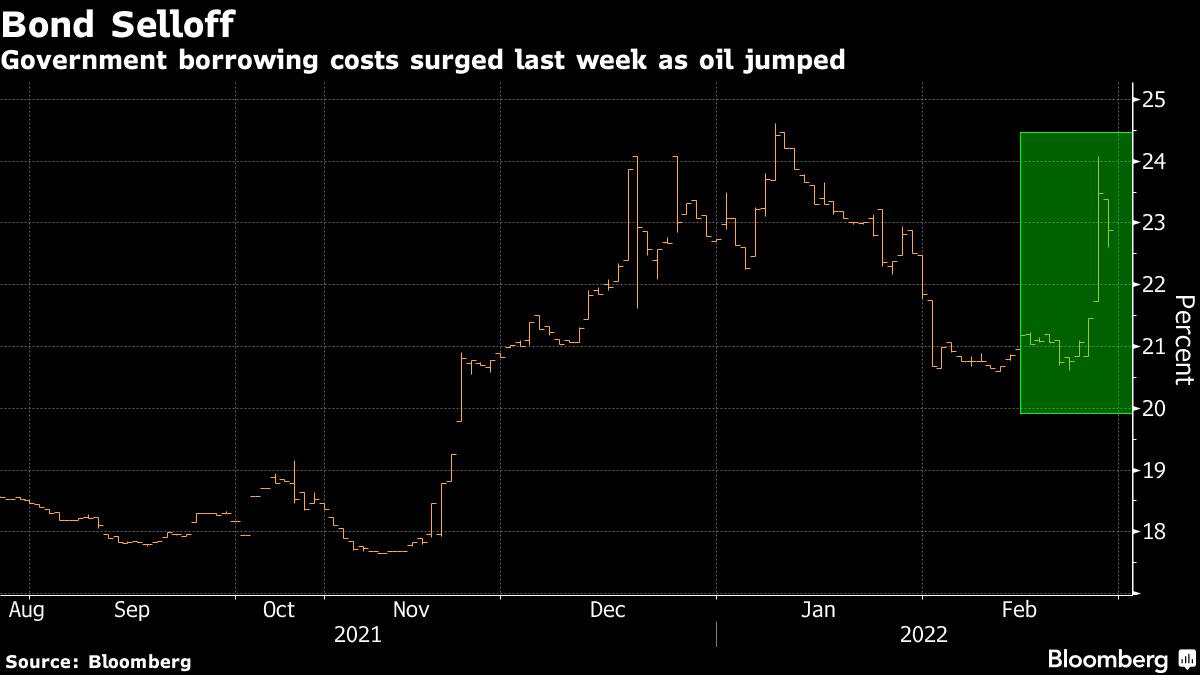Oil Jump Jolting Turkey Is Red Flag for Rest of Emerging Markets

(Bloomberg) — Markets in Turkey are flashing warning signs that inflationary pressures are building in the developing world as oil prices spike.
Most Read from Bloomberg
Despite spending billions of dollars to shield the currency from surging energy prices last week, the lira extended the fifth-biggest depreciation in emerging markets since Feb. 11. The yield on two-year government notes jumped more than 210 basis points in the five days through Friday, second only to local debt issued by Russia, which now faces sanctions from the U.S. and its allies.
To be sure, the selloff was aggravated by Turkey’s extraordinarily loose monetary policy that has already fanned runaway consumer prices. But the aggressive repricing shows just how much is at stake for a country that imports almost all the oil and natural gas it consumes. And it points to headwinds that a whole gamut of energy-importing economies such as India and South Africa face after Russia invaded Ukraine.
Oil prices extended its advance on Monday after another round of international sanctions on Russia over the weekend amplified concerns about energy shortages. The Turkish lira was steady in London trading hours, after weakening as much as 2% earlier.
“Many EM economies, like Turkey, are struggling to recover from the pandemic and an oil price shock compounds that,” said Brendan McKenna, a strategist at Wells Fargo in New York. “As growth prospects worsen, inflation spikes and current accounts move further into deficit, EM FX could come under sharp pressure.”
EM Weekly Podcast: Latest Russia Sanctions, Turkey Inflation
The MSCI Emerging Markets Currency Index posted its first weekly decline in a month, and the second largest this year. It comes as imminent rate hikes in the U.S. threaten to drain capital from the developing world. Traders are now betting on as many as six quarter-point hikes from the Federal Reserve this year, starting in March.
‘Triple Whammy’
It’s what Witold Bahrke, a Copenhagen-based senior macro strategist at Nordea Investment, describes as a “triple whammy” of higher oil prices, “stiff monetary headwinds” and a slowdown in global trade.
India, the Philippines and Thailand will likely stand to lose the most in Asia as a sustained increase in oil fans inflation, slows growth and weakens their currencies, according to Nomura Holdings Inc. Their central banks have signaled that they plan to stay accommodative for as long as needed to support growth, which runs the risk of driving consumer prices higher.
For Citigroup Inc., other countries that are vulnerable include Chile and Hungary, which raised its key interest rate as expected last week. Deputy Governor Barnabas Virag said inflation risks have “unequivocally strengthened” since last month and all rate-setters back the need for a continuation of the rate-hike cycle.
While other emerging markets position to counter price pressures with even more tightening, Turkey’s response has been unconventional — it has cut rates 500 basis points since September. Instead, the government launched a new type of savings account in December designed to protect lira savings against any foreign-currency losses incurred, an attempt to deter local demand for dollars and euros without hurting growth.
Wolfango Piccoli, the co-president of Teneo, meanwhile says each $10 increase in the price for a barrel of oil costs the country about $4 billion in extra imports, widening its current-account deficit. The shortfall grew for a second month in December.
Citigroup holds an underweight position in the lira in its model portfolio, saying the country’s net energy imports, as a percentage of its economy, are the highest in the developing world after Ukraine.
Turkey’s next test will be on Thursday, when economists expect consumer prices accelerated to an annual 52.5% in February, the highest since April 2002. That would shrink the real rate — the nation’s policy rate after inflation is stripped out — to minus 38.50%, by far the lowest in the world.
“Beyond the Ukraine tragedy, the most immediate ripple effect throughout EM and the rest of the world is via energy prices and inflation that will again stay higher for longer,” said Delphine Arrighi, the London-based head of emerging market debt at GuardCap Asset Management Ltd.
This Week
Here are some of the most important economic data events to watch this week:
-
China’s official manufacturing purchasing managers’ index probably contracted in February and the non-manufacturing sector likely slowed
-
Ukraine’s central bank will probably hike rates by 100 basis points on Thursday, according to Citigroup. Signs of distress in Ukraine’s debt markets deepened last week following Russia’s assault
-
Malaysia is set to keep its benchmark rate unchanged Thursday
-
The Ukraine crisis has increased the risk of a rate hike as soon as in May, though Bank Negara Malaysia is more likely to act in July, according to Bloomberg Economics
-
-
Inflation data due from Indonesia, Peru, Thailand, South Korea and the Philippines. Turkey, India, Hungary and South Korea will report on fourth-quarter GDP
-
Mexico’s central bank, which is considering raising interest rates again in March, will publish its quarterly inflation report on Wednesday
(Updates prices, adds analyst voice in final paragraph.)
Most Read from Bloomberg Businessweek
©2022 Bloomberg L.P.




